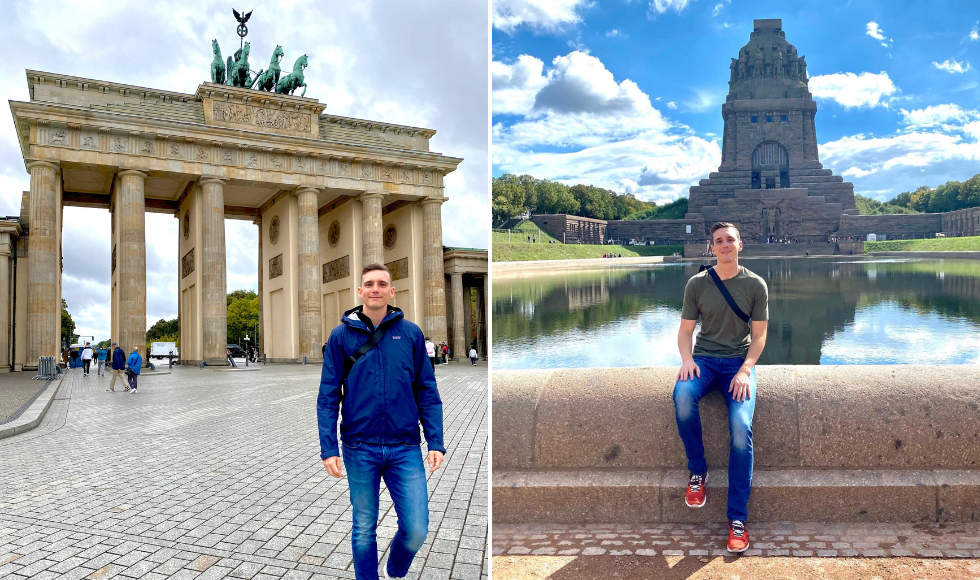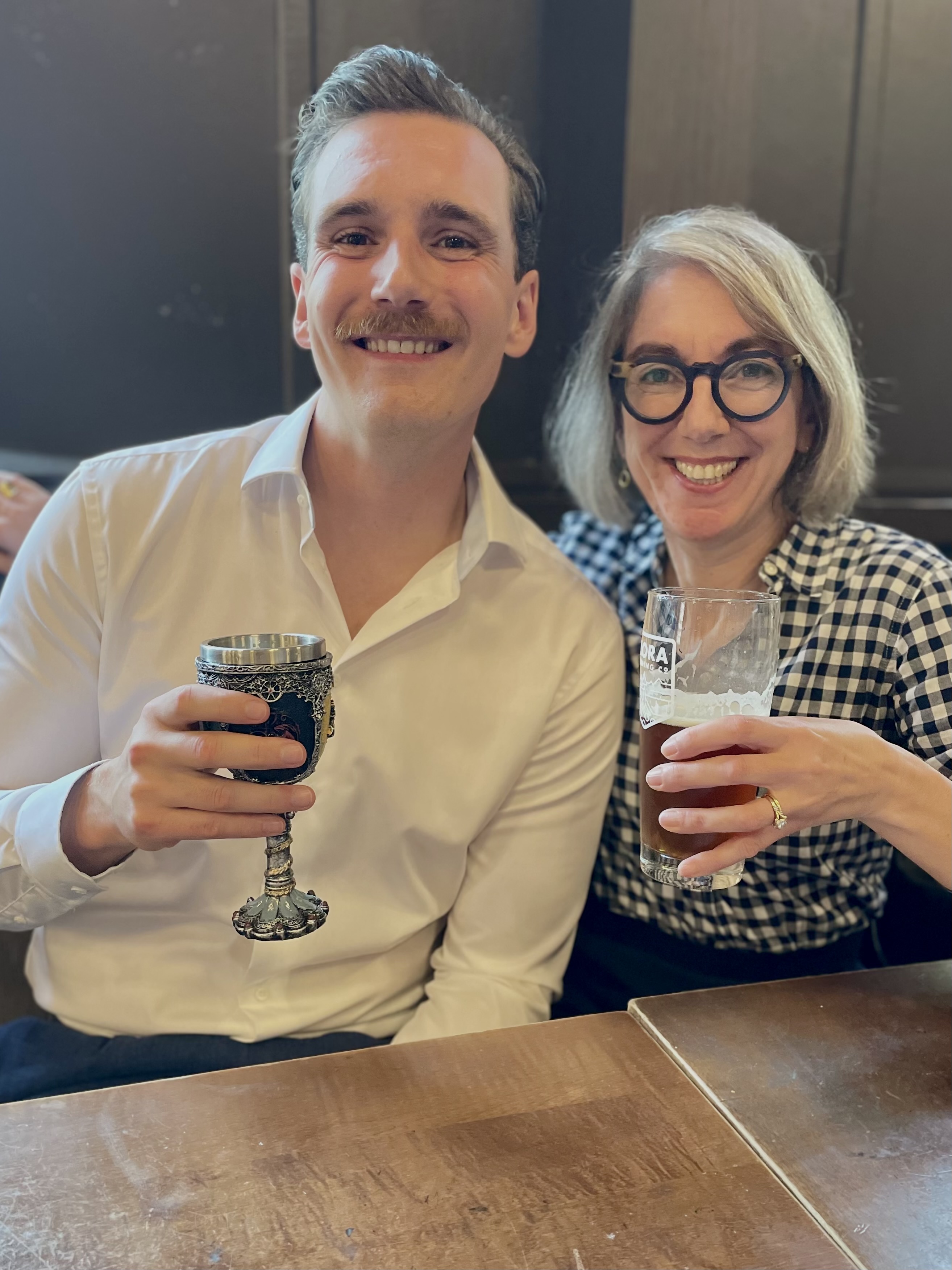‘Good historical research offers an opportunity to understand the present’

(Left) PhD graduate Ryan Heyden at the Brandenburg Gate in Berlin, Germany. (Right) Heyden at the Monument to the Battle of the Nations in Leipzig.
At this year’s Fall convocation ceremony for the Faculties of Humanities and Social Sciences, the DeGroote School of Business, and the Arts and Science program, Ryan Heyden will be graduating from McMaster for the third and final time — this time as a brand-new PhD.
Although he started his time at McMaster as an undergraduate studying Life Sciences, Heyden quickly discovered that, while science was interesting, history was where his real interests lay.

“I have always been able to get lost in a history book and podcast, a historical drama, or a conversation about a specific past event with a friend,” he says. “History felt like the right fit for me at the time, and I never looked back.”
Following a bachelor’s and master’s degree in history, Heyden says he caught the bug for doing historical research, and stuck around to pursue a PhD, which he completed this past September.
In keeping with university tradition, his PhD supervisor, Pamela Swett, dean of the Faculty of Humanities and a professor of history, will place Heyden’s doctoral hood over his head.
“As a supervisor, hooding a student is one of my favourite moments in the entire PhD journey — even though it’s a little bittersweet,” says Swett. “Ryan has done stellar work, and I’m so very proud of his success. I know there are many great things in his future.”
We chatted with Heyden about his journey to what will be his final convocation as a McMaster student.
Can you tell us a little about your research?
My PhD is in modern European history with a specialization in 20th-century Germany and the history of humanitarianism, and my dissertation is a history of the German Red Cross(es) in divided Germany after 1945.
When the Second World War ended, the Allied Powers and Soviet Red Army deemed the German Red Cross, one of Europe’s oldest humanitarian organizations, to be complicit in the crimes of the Nazi regime. My research explores both the dissolution of the organization after that decision and the creation of two new Red Cross organizations in an emerging liberal democratic West Germany and under a communist dictatorship in East Germany.
Drawing on institutional and government records, newspapers, and Red Cross publications, I argue that humanitarianism is a fickle, political and amorphous concept that became a useful tool in the construction of two distinct ideological projects in divided Germany during the Cold War.
What inspired you to get into your field?
I love the investigative work of teasing out the overlapping political, cultural, economic and social currents that inform why events have happened. I’m also interested and inspired by how the past informs the present. Whether it’s a politician’s rhetoric, a pundit’s critique of a government policy, your favourite author’s latest book, or an artist’s new song, we draw on the past to inform our perceptions of the world.
My interests in Germany, migration and humanitarianism are more personal. My maternal grandmother immigrated to Canada in the early 20th century from Ukraine, and my paternal grandparents left Germany during the 1950s.
I’ve always been interested in learning about the places my family members came from and what brought them to Canada. That history of migration is closely tied to histories of war and post-war humanitarian action, which often created the impetus for the movement of people either by force or voluntarily as families sought safety from violence or a more economically secure life outside of Europe.
What are some of the influences on your work?
Like many historians, my research interests are shaped in part by current events. When I started my PhD, Germany was in the process of welcoming the West’s largest number of Syrian refugees, who were displaced by war and protracted conflict in the Middle East. The German Red Cross was a major participant in resettling those families in Germany.
As I researched the roles of the Red Cross in responding to humanitarian crises and natural disasters after World War Two, the events of the present continued to shape the questions I asked and the priorities I took in my research.
What do you see as the impact of your work?
Good historical research offers an opportunity to understand the present. The questions we ask often seek to provide context and clarity to the events around us, in addition to feeding our own personal desire to understand a niche topic or geek out on a specific subject.
My work on humanitarianism and the influence of politics and ideology on humanitarian organizations can help us understand how aid organizations must navigate complex social and geopolitical climates to deliver aid.
Our world is defined by geopolitical conflicts that are creating massive humanitarian crises. We are also experiencing a climate crisis that induces natural disasters at alarming intensities and overwhelming frequencies.
While this moment feels unique in our 24-hour news cycle, the events of the 20th century show us that humanitarian organizations have faced such difficulties before, and just maybe those past experiences can offer us something to navigate current events.
Are there any memorable moments that stand out to you from this journey?
I walk away with so many memorable moments, but a few highlights are living and researching in Berlin and Washington DC, making friends and colleagues all over the world, publishing my first article, and the moment my dissertation committee said, “Congratulations, Dr. Heyden” on the day of my defence.
The PhD was as much a journey of personal discovery as it was a lesson in doing research at the highest level. There are emotional highs and lows, and there are moments of confidence and battles with imposter syndrome. But I stand at the end of the journey very proud of what I have learned, the researcher and writer that I am, the colleagues and friends I have made, and that I am confidently and authentically myself.


